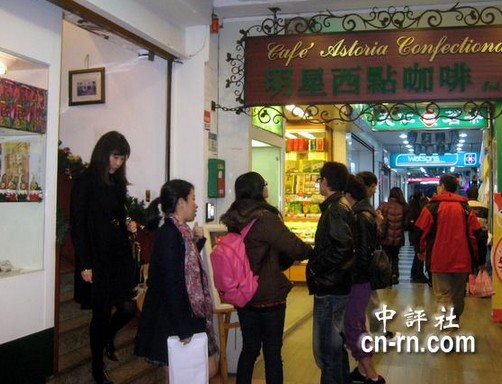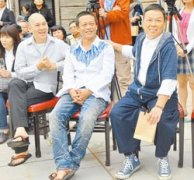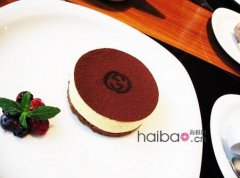Taipei's eternal literary landmark "Star Cafe"

The eternal literary landmark of Taipei, "the first floor of Star Cafe, Astoria means" star "in Russian. (photo by Zou Qiaoyun of the China Central Review)

The cafe on the second and third floors is going up a staircase, and a group of young friends are discussing whether to eat here or not. (photo by Zou Qiaoyun of the China Central Review)
Taipei, 17 Dec (Reporter Zou Qiaoyun) the "Star Cafe" located near Taipei Station on Wuchang Street in Taipei City has the same background as the "Taipei people" written by well-known writer Bai Xianyong. The Russian owner from Shanghai opened the store in 1949, the year Chiang Kai-shek moved to Taiwan with the national government, and people from various provinces of the mainland poured into Taiwan. Jiang Fangliang, Chiang Ching-kuo's Russian wife, liked to come here to buy "fudge" and "walnut cake" to relieve nostalgia. Later, poets and poets often gathered here, and young writers and artists came to "shop in cafes" in the 1960s and 1970s. Because fate will become a famous art salon in Taipei and the cradle of Taiwan literature.
Today, the "Star Cafe" is like a "star toilet water". The two "stars" from Shanghai have gone through the prosperity and will always be the undefeated memory of the people of old Taipei.
The Star Cafe looks like an ordinary bakery, and its history can be traced back to the October Revolution in Russia. Aristocratic George George Elsner came to Taiwan, opening a "Star West Bakery" in Taipei with Taiwanese Chien Jin Cone in 1949 and opening a cafe on the second floor next year. At that time, the rare Russian West Point was loved by Chiang Ching-kuo and his wife, who had a history with Russia. Jiang Fangliang often met with Russians here to savor the cuisine and music of his hometown and relieve his homesickness.
"in Astoria', Jiang Fangliang is not called Jiang Fangliang, but is called Fena. Chiang Ching-kuo is not called Chiang Ching-kuo, but Nikolai." The degree of friendship between stars and political circles is evident.
In 1959, poet Zhou Mengdee set up a small newsstand on the first floor outside the bakery, and the Star Cafe began to attract literary and artistic friends. In the 1960s, Modern Literature and Literature Quarterly were successively published, and well-known writers Bai Xianyong, Wang Wenxing, Chen Ruoxi, Wei Tianyi, Chen Yingzhen, Huang Chunming, and others often gathered here to create, and even used as office proofreading manuscripts. As a result, many heavyweight writers in Taiwan's literary world have emerged. The star then becomes the literature lover salon, the literature and art youth comes here to make a pilgrimage to become the custom.
"Tea is meditating / coffee is meditating / literature is talking / art is talking / time is Mercedes-Benz / space is spreading on manuscript paper." When the stars went out of business in the late 1980s, Taiwanese poet Romain took it as a discipline.
When the star reopened in 2004, the original layout, tables and chairs were preserved, and memories of the past flooded into the minds of many old Taipei people. In 2009, the book "No. 7 Wuchang Street" included all the details of the stars. Whether they are young artists or not, they walk into a cafe with narrow stairs and black-and-white photos, faint yellow wall lamps, sitting in front of old-fashioned high-backed train chairs and wooden marble tables, as if they can still smell the smell of time.
Have a cup of coffee! Taste the journey of Taiwanese strangers and literature.
Important Notice :
前街咖啡 FrontStreet Coffee has moved to new addredd:
FrontStreet Coffee Address: 315,Donghua East Road,GuangZhou
Tel:020 38364473
- Prev

Cai Liang Coffee Corridor Collection years
Director Tsai Liang-Liang co-opened "Tsai Ming-Liang Coffee Corridor" with his beloved apprentice Li Kangsheng. The old record player, dressing mirror, red velvet chairs, and even rattan chairs, which can only be seen in Ah Gong's house, are filled with every corner, recreating the retro style of the 1960s.
- Next

Gucci Cafe in Ginza, Japan (Gucci Cafe)
Gucci Coffee Shop (Gucci Cafe) in Ginza, Japan is the second Gucci Cafe (Gucci Cafe) in the world after the Milan headquarters, and the coffee shop is located on the fourth floor of Gucci Ginza. The entire Gucci Cafe (Gucci Cafe) can hold about 50 people. The waiters here are also carefully selected, and the uniforms are well-fitting black shirts and black trousers. A waiter with a super good attitude
Related
- What documents do you need to go through to open a coffee shop? coffee shop coffee shop certificate processing process
- How to purchase Coffee beans in small Cafe how to choose a suitable supplier for domestic Coffee supply Company
- How to drink Starbucks Fragrance White Coffee? how to make Australian White Coffee? what Italian coffee beans are recommended?
- The Story of Flora Coffee: the name of Flora Coffee Bean and the implication of the Flowers on Florna Coffee
- How much does a cup of coffee cost? How much is the profit of a cup of coffee? What is the profit of the coffee shop in a year?
- Yunnan small Coffee, known as "fragrant Coffee", introduces the characteristics of Alpine Arabica Coffee producing areas in Yunnan, China
- 2023 latest Starbucks full menu price list how much is a cup of Starbucks coffee what is better to drink the most popular hot and cold drinks recommended
- Starbucks different kinds of Coffee Price list Starbucks menu 2023 Top Ten Best drinks in Starbucks
- Starbucks Spring praise Comprehensive matching Coffee Bean theme Story Packaging implication and taste description
- The cost of a cup of coffee latte American coffee cost price and selling price

